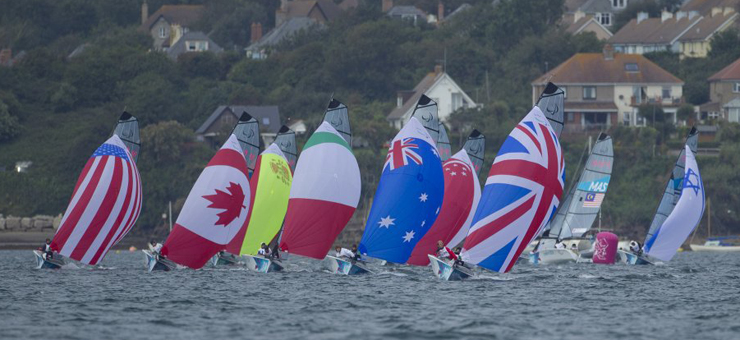Sailing

British sailors put in solid performances in Beijing but did not win any medals. This time around, the team were determined to bring back Britain’s first medal since Sailing became a full Paralympic programme sport in 2000.
The experience of Beijing had paid dividends for the GB teams over the years preceeding London 2012, and the crews had positive results at world level on which they could build at the Paralympics.
Alexandra Rickham and Niki Birrell, in the SKUD 18 class, turned their 6th place finish in Beijing into gold medals at the 2009, 2010, 2011 and 2012 World Championships and went into London as one of the teams to beat. In a closely fought competition, the British athletes won bronze.
 A friendly rivalry between 2.4mR sailors Helena Lucas and Megan Pascoe for the one British spot at the Games reaped international success for both British competitors. Eventually it was Lucas, who also represented ParalympicsGB at the Beijing Games, that got the nod having claimed bronze at the 2011 IFDS World Championships and proved her consistency in the early part of 2012. Lucas proved the selectors right, when she won a fantastic gold - the first British medal in Sailing at the Paralympic Games.
A friendly rivalry between 2.4mR sailors Helena Lucas and Megan Pascoe for the one British spot at the Games reaped international success for both British competitors. Eventually it was Lucas, who also represented ParalympicsGB at the Beijing Games, that got the nod having claimed bronze at the 2011 IFDS World Championships and proved her consistency in the early part of 2012. Lucas proved the selectors right, when she won a fantastic gold - the first British medal in Sailing at the Paralympic Games.
In the highly competitive Sonar class, the GB team of John Robertson, Hannah Stodel and Stephen Thomas had two silver medals and one bronze from their last three World Championships. The trio were in the mix for a podium finish at London 2012 before a points penalty meant they could not secure the medal they sought.
- First year at a Paralympic Games:
- Atlanta 1996 (demonstration class for Sonar only)
Sydney 2000 (Sonar and 2.4mR)
Beijing 2008 (SKUD 18 added to the Paralympic programme) - Brief history:
- Sailing for disabled people became increasingly popular during the 1980s and in 1988 the International Handicap Sailing Committee was formed. In 1991, International Sailing Federation recognised the IHSC and the organisation was re-named the International Foundation for Disabled Sailing, which remains the international organisation today.
- Eligible impairment groups:
- All physical impairment groups and athletes with a visual impairment
- London medal table:
- 1 = Great Britain, Netherlands (one gold, one bronze)
3 - Australia (one gold) - GB medals in London:
- Helena Lucas, gold, 2.4mR
Alexandra Rickham and Niki Birrell, bronze, SKUD 18 - Did you know:
- Sonar crew Stephen Thomas is also a Winter Paralympian, having competed for ParalympicsGB in the sledge hockey event at Torino 2006
- London 2012 venue:
- Weymouth and Portland
- Rio 2016 venue:
- Marina da Glória (Copacabana Zone)
Rules:
There are three medal events at the Games. These are the 2.4mR, SKUD 18 and Sonar classes, featuring one, two and three sailors per boat respectively. With the exception of the SKUD, which must have at least one female on board, crews are non-gender specific.
Each event consists of a series of up to 11 races – weather permitting.
Sailors accumulate points according to their positions after each race, with one point for first, two for second and so on. At the end of racing, all the points except the worst score from each team are added together. The winner is the sailor or team with the lowest points total at the end of the races (unlike the Olympic Games, where there is a one-off final).
Penalties are given for rule infringements, with the offending boats having to perform penalty turns before continuing around the course marked out by buoys.
In sailing at the Paralympic Games, modifications are made to the equipment in order to suit the athlete's functional ability. Some of the modifications often seen in Paralympic Sailing are adapted seats and adapted tillers for steering.
Classification:
The Sailing classification system is based on four factors – stability, hand function, mobility and vision. Points are awarded to each athlete from 1 to 7, with lower points awarded for the lowest levels of functionality.
Single-Person Keelboat (2.4mR)
The sailor must fulfill the criteria of minimal impairment.
Two-Person Keelboat (SKUD 18)
At least one of the crew shall be female.
One sailor shall be classified as TPA (Two-Person format Classification A), and the other sailor shall be classified as TPB (Two Person System Classification B), which is defined as having at least minimal impairment.
Three-Person Keelboat (Sonar)
Points are given from 1 (maximum impairment) to 7 (minimum impairment) for the individual sailor. The total crew is allowed a maximum of 14 points. No Sailing advantage is given to a crew with a total of less than fourteen points.
All three Sailing events feature keelboats, which offer enhanced stability.


Comments
The BPA would like to see lots of people engaging with the news and information that we post on our website. If you would like to participate in the conversation, however, please ensure you comply with the House Rules. The BPA reserves the right to remove posts which do not comply with these Rules or which are considered irrelevant to the post.